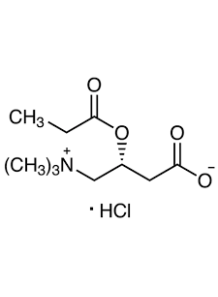Propionyl-L-carnitine HCl (PLC)
- Product Code: 34160
a form of carnitine, an amino acid derivative, and it has some distinct characteristics and potential benefits. Carnitine plays a crucial role in the production of energy by transporting fatty acids into your cells' mitochondria
- -
- -
- -
- -
- -
- -
- -
- -
- -
- -
- -
- -
- -
- -
- -
- -
- -
- -
| Test Name | Specification |
|---|---|
| Appearance | White crystalline or crystalline powder |
| Identification | Infrared Absorption |
| Specific rotation [?]D20 | -25 to -28 degree |
| pH | 2-3 |
| Loss on drying | Not more than 1.0% |
| Residue on ignition | Not more than 0.50% |
| Heavy metals | Not more than 15ppm |
| Lead | Not morte than 3ppm |
| Arsenic(as As2o3) | Not more than 3ppm |
| Total Plate Count | Not more than 1000cfu/g |
| Yeast and Molds | Not more than 100cfu/g |
| Salmonella | Negative |
| E.coli | Negative |
| Assay | Not less than 98.0% |
(Hygroscopic powder)
Propionyl-L-carnitine HCl (PLC) is a form of carnitine, an amino acid derivative, and it has some distinct characteristics and potential benefits. Carnitine plays a crucial role in the production of energy by transporting fatty acids into your cells' mitochondria, where they can be used as a source of energy.
Here are some key points about Propionyl-L-carnitine HCl:
Structure and Form: Propionyl-L-carnitine is a modified form of L-carnitine, where a propionyl group is attached to the carnitine molecule. The hydrochloride (HCl) form is a salt of propionyl-L-carnitine.
Function and Benefits:
Energy Production: Like other forms of carnitine, PLC is involved in the transportation of fatty acids into the mitochondria, where they can be oxidized for energy.
Blood Flow: Some studies suggest that propionyl-L-carnitine may have vasodilatory effects, improving blood flow. This has led to research exploring its potential benefits for cardiovascular health.
Exercise Performance: Some athletes and fitness enthusiasts use carnitine supplements, including propionyl-L-carnitine, believing it might enhance exercise performance.
Cardiovascular Health: Research has explored the potential benefits of propionyl-L-carnitine for individuals with cardiovascular conditions, such as peripheral arterial disease (PAD). It is thought to improve blood flow and exercise tolerance in such cases.
Be the first to review this product :-)
Recommend Lab-Service
| Lab Service | Price |
|---|
a form of carnitine, an amino acid derivative, and it has some distinct characteristics and potential benefits. Carnitine plays a crucial role in the production of energy by transporting fatty acids into your cells' mitochondria
(Hygroscopic powder)
Propionyl-L-carnitine HCl (PLC) is a form of carnitine, an amino acid derivative, and it has some distinct characteristics and potential benefits. Carnitine plays a crucial role in the production of energy by transporting fatty acids into your cells' mitochondria, where they can be used as a source of energy.
Here are some key points about Propionyl-L-carnitine HCl:
Structure and Form: Propionyl-L-carnitine is a modified form of L-carnitine, where a propionyl group is attached to the carnitine molecule. The hydrochloride (HCl) form is a salt of propionyl-L-carnitine.
Function and Benefits:
Energy Production: Like other forms of carnitine, PLC is involved in the transportation of fatty acids into the mitochondria, where they can be oxidized for energy.
Blood Flow: Some studies suggest that propionyl-L-carnitine may have vasodilatory effects, improving blood flow. This has led to research exploring its potential benefits for cardiovascular health.
Exercise Performance: Some athletes and fitness enthusiasts use carnitine supplements, including propionyl-L-carnitine, believing it might enhance exercise performance.
Cardiovascular Health: Research has explored the potential benefits of propionyl-L-carnitine for individuals with cardiovascular conditions, such as peripheral arterial disease (PAD). It is thought to improve blood flow and exercise tolerance in such cases.
| Mechanism | - |
| Appearance | - |
| Longevity | - |
| Strength | - |
| Storage | - |
| Shelf Life | - |
| Allergen(s) | - |
| Dosage (Range) | - |
| Recommended Dosage | - |
| Dosage (Per Day) | - |
| Recommended Dosage (Per Day) | - |
| Mix Method | - |
| Heat Resistance | - |
| Stable in pH range | - |
| Solubility | - |
| Product Types | - |
| INCI | - |
Cart
No products



